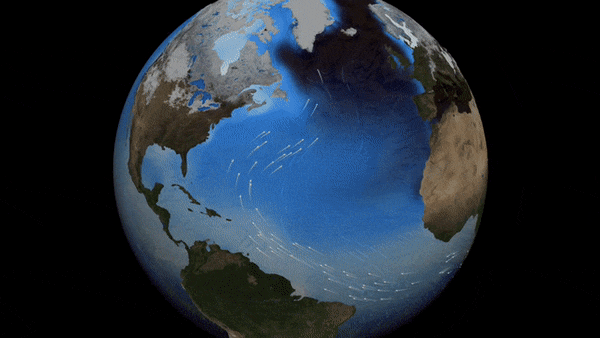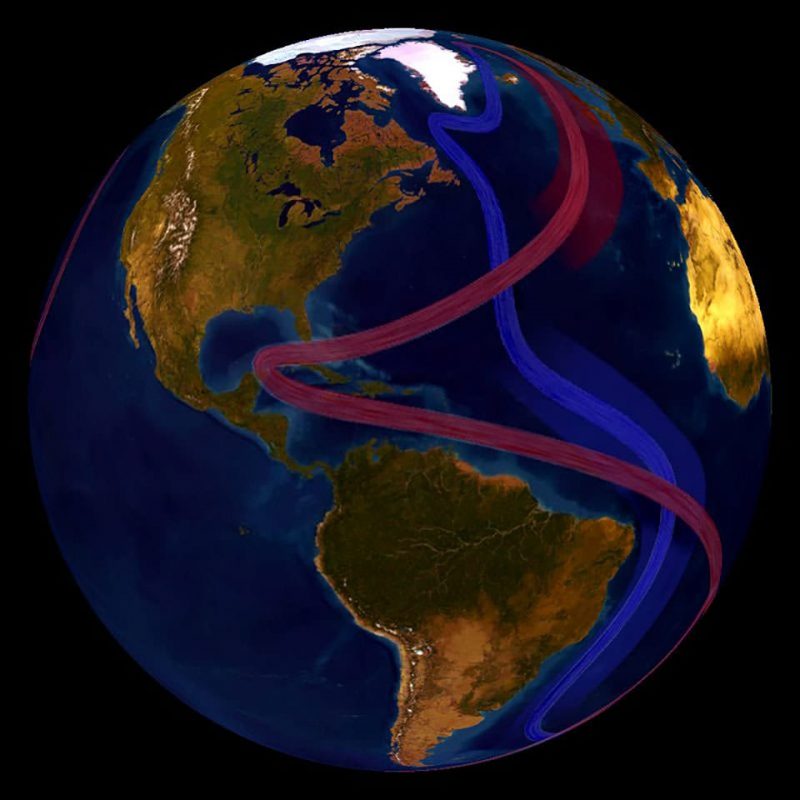
Atlantic ocean current collapse ahead
We don’t often see a scientific paper that uses the word warning in its title. But a new paper published today (July 25, 2023) in the prestigious journal Nature does use that word. It describes an imminent collapse of a key system of ocean currents, due to global warming. The paper is titled Warning of a forthcoming collapse of the Atlantic meridional overturning circulation.
And, this paper says, the collapse could come as early as 2025.
The famous Gulf Stream is part of the Atlantic Meridianal Overturning Circulation, aka the AMOC.
These currents help transport heat around the globe, so they are key to various weather and climate conditions.
And the new calculations come from scientists at the University of Copenhagen. Peter Ditlevsen of the university’s Niels Bohr Institute led the study, and he told The Guardian:
I think we should be very worried. This would be a very, very large change. The AMOC has not been shut off for 12,000 years [editors’ note: since the last Ice Age].
What would happen?
A collapse of this system of currents could drop temperatures in Europe and Scandinavia, raise sea level on the U.S. East Coast, and disrupt rainfall that billions of people depend on for food in India, South America and west Africa.
The shutdown could come as early as 2025, these scientists found, or as late as 2095, with the greatest probability occuring raround the year 2060 if current greenhouse gas emissions persist.
These new results contradict the latest report from the IPCC, which suggested the AMOC would not shut down until sometime in the 22nd century.
As always, not everyone agrees
David Thornalley at University College London, told The Guardian the study had large caveats and unknowns and said further research was essential. But, he said:
If the statistics are robust and a relevant way to describe how the actual AMOC behaves, then this is a very concerning result.
Stefan Rahmstorf at the University of Potsdam, Germany, added:
There is still large uncertainty where the AMOC tipping point is, but the new study adds to the evidence that it is much closer than we thought. A single study provides limited evidence, but when multiple approaches have led to similar conclusions this must be taken very seriously, especially when we’re talking about a risk that we really want to rule out with 99.9% certainty. Now we can’t even rule out crossing the tipping point in the next decade or two.

How do they know?
A statement from the University of Copenhagen said the new research came after the scientists used advanced statistical tools and ocean temperature data from the last 150 years. It said:
The researchers calculated that the ocean current, known as the Thermohaline Circulation or the Atlantic Meridional Overturning Circulation (AMOC), will collapse – with 95 percent certainty – between 2025 and 2095. This will most likely occur in 34 years, in 2057, and could result in major challenges, particularly warming in the tropics and increased storminess in the North Atlantic region.
Peter Ditlevsen added:
While a cooling of Europe may seem less severe as the globe as a whole becomes warmer and heat waves occur more frequently, this shutdown will contribute to an increased warming of the tropics, where rising temperatures have already given rise to challenging living conditions.
He added:
Our result underscores the importance of reducing global greenhouse gas emissions as soon as possible.
Early warning signals
The researchers’ prediction is based on observations of early warning signals that ocean currents exhibit as they become unstable. These Early Warning Signals for the Thermohaline Circulation have been reported previously.
But, according to these scientists, it only now has the development of advanced statistical methods made it possible to predict just when a collapse will occur. Susanne Ditlevsen of the University of Copenhagen’s Department of Mathematical Sciences – the new study’s co-author – said:
Using new and improved statistical tools, we’ve made calculations that provide a more robust estimate of when a collapse of the Thermohaline Circulation is most likely to occur, something we had not been able to do before.
They said the thermohaline circulation has operated in its present mode since the last Ice Age, where the circulation was indeed collapsed:
Abrupt climate jumps between the present state of the AMOC and the collapsed state has been observed to happen 25 times in connection with iceage climate. These are the famed Dansgaard-Oeschger events first observed in ice cores from the Greenlandic ice sheet.
At those events climate changes were extreme with 10-15 degrees changes over a decade, while present days climate change is 1.5 degrees warming over a century.
Bottom line: Climate is complicated. And today scientists are speaking of an Atlantic Ocean current collapse that could change weather conditions across the globe.
Source: Warning of a forthcoming collapse of the Atlantic meridional overturning circulation
The post Is an Atlantic Ocean current collapse imminent? first appeared on EarthSky.
from EarthSky https://ift.tt/qYUNcmi

Atlantic ocean current collapse ahead
We don’t often see a scientific paper that uses the word warning in its title. But a new paper published today (July 25, 2023) in the prestigious journal Nature does use that word. It describes an imminent collapse of a key system of ocean currents, due to global warming. The paper is titled Warning of a forthcoming collapse of the Atlantic meridional overturning circulation.
And, this paper says, the collapse could come as early as 2025.
The famous Gulf Stream is part of the Atlantic Meridianal Overturning Circulation, aka the AMOC.
These currents help transport heat around the globe, so they are key to various weather and climate conditions.
And the new calculations come from scientists at the University of Copenhagen. Peter Ditlevsen of the university’s Niels Bohr Institute led the study, and he told The Guardian:
I think we should be very worried. This would be a very, very large change. The AMOC has not been shut off for 12,000 years [editors’ note: since the last Ice Age].
What would happen?
A collapse of this system of currents could drop temperatures in Europe and Scandinavia, raise sea level on the U.S. East Coast, and disrupt rainfall that billions of people depend on for food in India, South America and west Africa.
The shutdown could come as early as 2025, these scientists found, or as late as 2095, with the greatest probability occuring raround the year 2060 if current greenhouse gas emissions persist.
These new results contradict the latest report from the IPCC, which suggested the AMOC would not shut down until sometime in the 22nd century.
As always, not everyone agrees
David Thornalley at University College London, told The Guardian the study had large caveats and unknowns and said further research was essential. But, he said:
If the statistics are robust and a relevant way to describe how the actual AMOC behaves, then this is a very concerning result.
Stefan Rahmstorf at the University of Potsdam, Germany, added:
There is still large uncertainty where the AMOC tipping point is, but the new study adds to the evidence that it is much closer than we thought. A single study provides limited evidence, but when multiple approaches have led to similar conclusions this must be taken very seriously, especially when we’re talking about a risk that we really want to rule out with 99.9% certainty. Now we can’t even rule out crossing the tipping point in the next decade or two.

How do they know?
A statement from the University of Copenhagen said the new research came after the scientists used advanced statistical tools and ocean temperature data from the last 150 years. It said:
The researchers calculated that the ocean current, known as the Thermohaline Circulation or the Atlantic Meridional Overturning Circulation (AMOC), will collapse – with 95 percent certainty – between 2025 and 2095. This will most likely occur in 34 years, in 2057, and could result in major challenges, particularly warming in the tropics and increased storminess in the North Atlantic region.
Peter Ditlevsen added:
While a cooling of Europe may seem less severe as the globe as a whole becomes warmer and heat waves occur more frequently, this shutdown will contribute to an increased warming of the tropics, where rising temperatures have already given rise to challenging living conditions.
He added:
Our result underscores the importance of reducing global greenhouse gas emissions as soon as possible.
Early warning signals
The researchers’ prediction is based on observations of early warning signals that ocean currents exhibit as they become unstable. These Early Warning Signals for the Thermohaline Circulation have been reported previously.
But, according to these scientists, it only now has the development of advanced statistical methods made it possible to predict just when a collapse will occur. Susanne Ditlevsen of the University of Copenhagen’s Department of Mathematical Sciences – the new study’s co-author – said:
Using new and improved statistical tools, we’ve made calculations that provide a more robust estimate of when a collapse of the Thermohaline Circulation is most likely to occur, something we had not been able to do before.
They said the thermohaline circulation has operated in its present mode since the last Ice Age, where the circulation was indeed collapsed:
Abrupt climate jumps between the present state of the AMOC and the collapsed state has been observed to happen 25 times in connection with iceage climate. These are the famed Dansgaard-Oeschger events first observed in ice cores from the Greenlandic ice sheet.
At those events climate changes were extreme with 10-15 degrees changes over a decade, while present days climate change is 1.5 degrees warming over a century.
Bottom line: Climate is complicated. And today scientists are speaking of an Atlantic Ocean current collapse that could change weather conditions across the globe.
Source: Warning of a forthcoming collapse of the Atlantic meridional overturning circulation
The post Is an Atlantic Ocean current collapse imminent? first appeared on EarthSky.
from EarthSky https://ift.tt/qYUNcmi

Aucun commentaire:
Enregistrer un commentaire